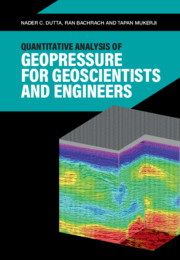Book contents
- Quantitative Analysis of Geopressure for Geoscientists and Engineers
- Quantitative Analysis of Geopressure for Geoscientists and Engineers
- Copyright page
- Contents
- Preface
- 1 Basic Pressure Concepts and Definitions
- 2 Basic Continuum Mechanics and Its Relevance to Geopressure
- 3 Mechanisms of Geopressure
- 4 Quantitative Geopressure Analysis Methods
- 5 Seismic Methods to Predict and Detect Geopressure
- 6 Integrating Seismic Imaging, Rock Physics, and Geopressure
- 7 Methods for Pore Pressure Detection
- 8 Gravity and EM Field Methods Aiding Pore Pressure Prediction
- 9 Geopressure Detection and Prediction in Real Time
- 10 Geopressure Prediction Using Basin History Modeling
- 11 Geohazard Prediction and Detection
- 12 Petroleum Geomechanics and the Role of Geopressure
- 13 Guidelines for Best Practices
- 14 Recent Advances in Geopressure Prediction and Detection Technology and the Road Ahead
- Book part
- References
- Index
10 - Geopressure Prediction Using Basin History Modeling
Published online by Cambridge University Press: 10 February 2021
- Quantitative Analysis of Geopressure for Geoscientists and Engineers
- Quantitative Analysis of Geopressure for Geoscientists and Engineers
- Copyright page
- Contents
- Preface
- 1 Basic Pressure Concepts and Definitions
- 2 Basic Continuum Mechanics and Its Relevance to Geopressure
- 3 Mechanisms of Geopressure
- 4 Quantitative Geopressure Analysis Methods
- 5 Seismic Methods to Predict and Detect Geopressure
- 6 Integrating Seismic Imaging, Rock Physics, and Geopressure
- 7 Methods for Pore Pressure Detection
- 8 Gravity and EM Field Methods Aiding Pore Pressure Prediction
- 9 Geopressure Detection and Prediction in Real Time
- 10 Geopressure Prediction Using Basin History Modeling
- 11 Geohazard Prediction and Detection
- 12 Petroleum Geomechanics and the Role of Geopressure
- 13 Guidelines for Best Practices
- 14 Recent Advances in Geopressure Prediction and Detection Technology and the Road Ahead
- Book part
- References
- Index
Summary
This chapter describes examples of basin modeling in 1D and 2D and shows the power of basin models to predict pore pressure. The fundamental conservation laws and partial differential equations used in basin modeling are presented. Mathematical derivations for 1D shale-on-shale and sand-on-shale compaction and pore pressure models are given in detail. While seismic models for pore pressure prediction predict pore pressure given present-day geology, basin modeling provides an alternate technique that describes the pore pressure distribution using transient models that depend on fluid and heat flow during geologic times along with other phenomena, such as changes in facies and geologic structures in paleotimes. So this approach not only tells us what the pore pressure is today but allows us to investigate the effect of uncertainties in geology in the past and their imprint on the present-day pressure distribution.
Keywords
- Type
- Chapter
- Information
- Publisher: Cambridge University PressPrint publication year: 2021

